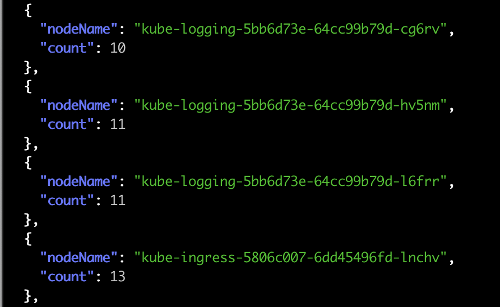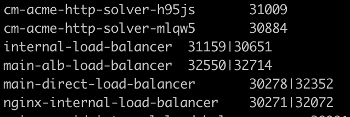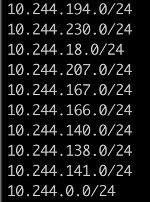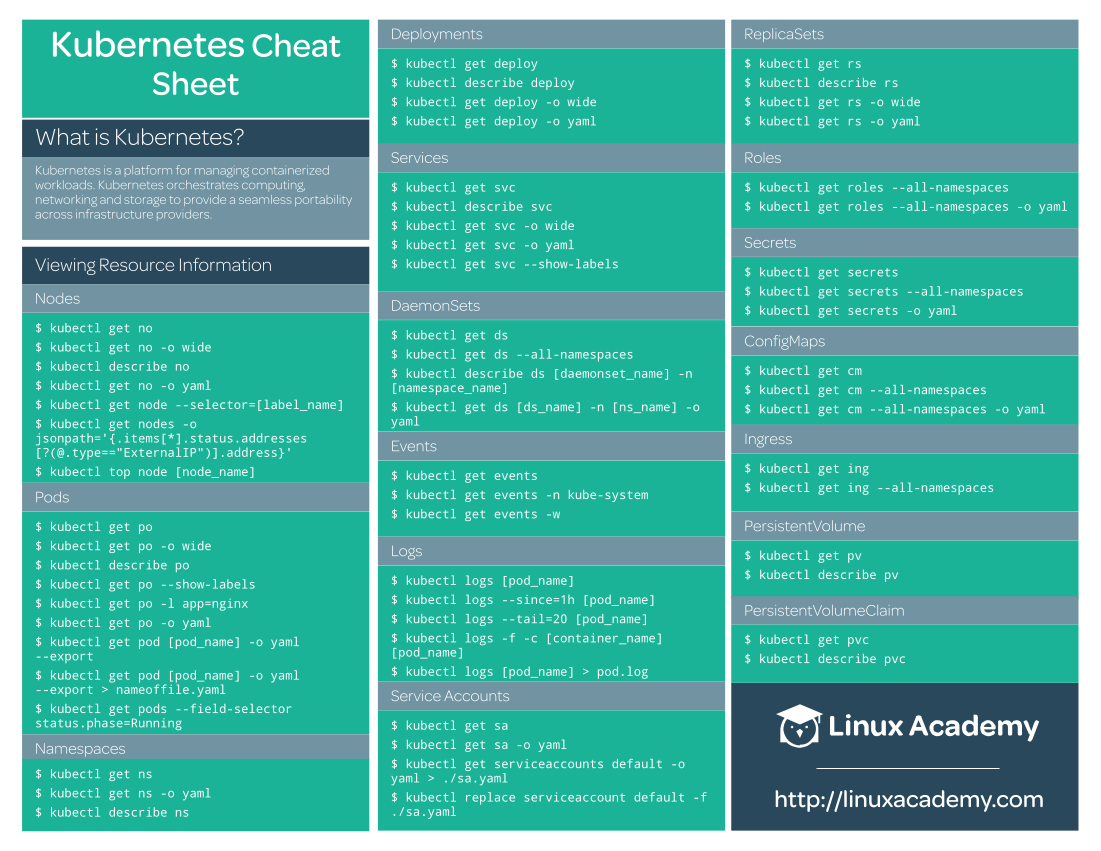
Einige Teams können sich für einige Leser als tägliche Routine herausstellen, aber wenn es diejenigen gibt, die neue Dinge für sich entdecken und dadurch ihre Effektivität verbessern, wird das Ziel des Artikels erreicht.
NB : Einige der unten aufgeführten Teams wurden von unseren Ingenieuren zusammengestellt, während andere im Internet gefunden wurden. Im letzteren Fall wurden sie getestet und als nützlich befunden.
So lass uns gehen!
pod'
- , pod'
--all-namespaces. , —-A( , Kubernetes 1.15). - pod', (..
Running)?
kubectl get pods -A --field-selector=status.phase!=Running | grep -v Complete

,--field-selector(. ). - :
kubectl get no -o json | \ jq -r '.items | sort_by(.status.capacity.memory)[]|[.metadata.name,.status.capacity.memory]| @tsv'

- pod' :
kubectl get po -o json --all-namespaces | \ jq '.items | group_by(.spec.nodeName) | map({"nodeName": .[0].spec.nodeName, "count": length}) | sort_by(.count)'

- , - DaemonSet - . — , - , DaemonSet':
ns=my-namespace pod_template=my-pod kubectl get node | grep -v \"$(kubectl -n ${ns} get pod --all-namespaces -o wide | fgrep ${pod_template} | awk '{print $8}' | xargs -n 1 echo -n "\|" | sed 's/[[:space:]]*//g')\" -
kubectl toppod', :
# cpu kubectl top pods -A | sort --reverse --key 3 --numeric # memory kubectl top pods -A | sort --reverse --key 4 --numeric - pod' — , :
kubectl get pods --sort-by=.status.containerStatuses[0].restartCount

, (. PodStatus ContainerStatus).
- Ingress', pod' . ,
-o wide:
kubectl -n jaeger get svc -o wide NAME TYPE CLUSTER-IP EXTERNAL-IP PORT(S) AGE SELECTOR jaeger-cassandra ClusterIP None <none> 9042/TCP 77d app=cassandracluster,cassandracluster=jaeger-cassandra,cluster=jaeger-cassandra
, , pod'. - pod' limits requests:
kubectl get pods -n my-namespace -o=custom-columns='NAME:spec.containers[*].name,MEMREQ:spec.containers[*].resources.requests.memory,MEMLIM:spec.containers[*].resources.limits.memory,CPUREQ:spec.containers[*].resources.requests.cpu,CPULIM:spec.containers[*].resources.limits.cpu'

-
kubectl run(create,apply,patch) —--dry-run.-o yaml, . :
kubectl run test --image=grafana/grafana --dry-run -o yaml apiVersion: apps/v1 kind: Deployment metadata: creationTimestamp: null labels: run: test name: test spec: replicas: 1 selector: matchLabels: run: test strategy: {} template: metadata: creationTimestamp: null labels: run: test spec: containers: - image: grafana/grafana name: test resources: {} status: {}
, / . - - :
kubectl explain hpa KIND: HorizontalPodAutoscaler VERSION: autoscaling/v1 DESCRIPTION: configuration of a horizontal pod autoscaler. FIELDS: apiVersion <string> APIVersion defines the versioned schema of this representation of an object. Servers should convert recognized schemas to the latest internal value, and may reject unrecognized values. More info: https://git.k8s.io/community/contributors/devel/api-conventions.md#resources kind <string> Kind is a string value representing the REST resource this object represents. Servers may infer this from the endpoint the client submits requests to. Cannot be updated. In CamelCase. More info: https://git.k8s.io/community/contributors/devel/api-conventions.md#types-kinds metadata <Object> Standard object metadata. More info: https://git.k8s.io/community/contributors/devel/api-conventions.md#metadata spec <Object> behaviour of autoscaler. More info: https://git.k8s.io/community/contributors/devel/api-conventions.md#spec-and-status. status <Object> current information about the autoscaler.
!
- IP- :
kubectl get nodes -o json | \ jq -r '.items[].status.addresses[]? | select (.type == "InternalIP") | .address' | \ paste -sd "\n" -

- nodePort, :
kubectl get --all-namespaces svc -o json | \ jq -r '.items[] | [.metadata.name,([.spec.ports[].nodePort | tostring ] | join("|"))]| @tsv'

- , CNI (, Flannel), pod' . pod', :
kubectl get nodes -o jsonpath='{.items[*].spec.podCIDR}' | tr " " "\n"

- pod' c timestamp :
kubectl -n my-namespace logs -f my-pod --timestamps 2020-07-08T14:01:59.581788788Z fail: Microsoft.EntityFrameworkCore.Query[10100]
, ? - , pod' —
--tail:
kubectl -n my-namespace logs -f my-pod --tail=50 - pod':
kubectl -n my-namespace logs -f my-pod --all-containers - pod' label':
kubectl -n my-namespace logs -f -l app=nginx - , , , :
kubectl -n my-namespace logs my-pod --previous
- ?
kubectl get secrets -o json --namespace namespace-old | \ jq '.items[].metadata.namespace = "namespace-new"' | \ kubectl create-f - - :
openssl req -x509 -nodes -days 365 -newkey rsa:2048 -keyout tls.key -out tls.crt -subj "/CN=grafana.mysite.ru/O=MyOrganization" kubectl -n myapp create secret tls selfsecret --key tls.key --cert tls.crt
Anstelle einer Schlussfolgerung - eine kleine Liste ähnlicher Materialien und Sammlungen im Internet:
- Das offizielle Cheatsheet aus der Kubernetes-Dokumentation;
- Eine kurze praktische Einführung und ein schönes 2-seitiges Tablet der Linux Academy, um die Zeit für angehende Ingenieure zu verkürzen:

- Eine sehr umfangreiche Liste von Befehlen von Blue Matador, unterteilt in Abschnitte;
- Eine Auswahl von Links in der Liste zu Tabellen mit Befehlen, Artikeln zum Thema und einigen Befehlen;
- Das Kubernetes-Cheat-Sheet GitHub-Repository eines anderen Enthusiasten enthält nur kategorisierte Befehle.
- Das GitHub-Repository für Kubectl-Aliase ist ein Paradies für Abkürzungen.
PS
Lesen Sie auch in unserem Blog:
- « Kubernetes kubectl»;
- « Kubernetes kubectl»;
- « Kubernetes».